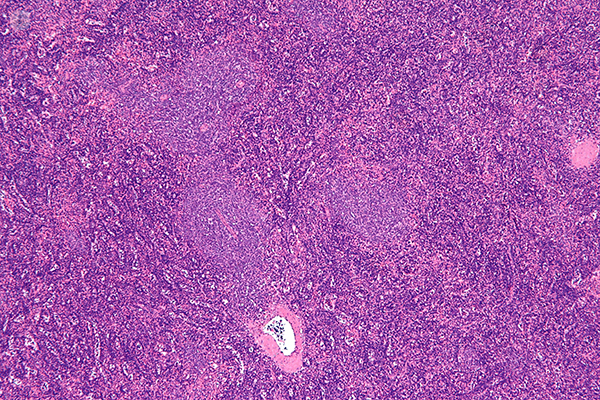


What is chronic lymphocytic leukaemia?
Chronic lymphocytic leukaemia (CLL) is a type of blood cancer. It affects a type of white blood cell called lymphocytes, which are made in the bone marrow before passing into the bloodstream. These cells are important for fighting disease.
The bone marrow starts producing an excess of underdeveloped lymphocytes that don’t work properly. Over time, this weakens the immune system and can lead to a number of other symptoms due to the over-production of lymphocytes crowding out other blood cells in the bone marrow and spreading to other organs via the blood.
Chronic lymphocytic leukaemia typically affects people over 60 years of age, with cases under the age of 40 being rare.
Prognosis of chronic lymphocytic leukaemia
Chronic lymphocytic leukaemia tends to progress slowly, developing over many years. It may not cause any symptoms, particularly early on, and may not require treatment if it is not causing any problems, with regular check-ups with the doctor to monitor the disease.
While treatment can’t cure chronic lymphocytic leukaemia, it can control the symptoms. Depending on how advanced the disease is when diagnosed, patients’ life expectancy can range from a matter of months (in very advanced cases) to over a decade (if caught early enough).
Symptoms of chronic lymphocytic leukaemia
Symptoms include:
Medical tests to diagnose chronic lymphocytic leukaemia
The main test for CLL is a blood test. X-rays and other scans can also be useful for identifying problems caused by CLL, and in some cases other tests like a bone marrow biopsy may be recommended.
What are the causes of chronic lymphocytic leukaemia?
The cause of chronic lymphocytic leukaemia is still unknown. It is thought that certain genes may slightly raise the risk of developing it.
Treatments for chronic lymphocytic leukaemia
If chronic lymphocytic leukaemia is not causing any symptoms or negatively affecting the patient’s quality of life, the doctor may recommend that they simply monitor the disease, and delay treatment until the disease progresses. This is because the treatments required to control symptomatic CLL can take a toll on the patient too. The main treatments are:
Which type of specialist treats chronic lymphocytic leukaemia?
Haematologists and oncologists are among the specialists that may be involved in treating CLL.
